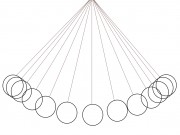Despite the potential for falling into an inescapable abyss of pretentiousness, Quartet happens to be a charming ode to music’s ability to endure. It also happens to be Dustin Hoffman’s directorial debut, and winds up becoming an appropriate effort for him, and all involved.
At the Beecham House for retired musicians, the residents perform a yearly birthday retrospective concert for Giuseppe Verdi, and it is the home’s most popular event and the residents practice dutifully. Wilfred (Billy Connelly), Reg (Tom Courtenay), and Cissy (Pauline Collins) have typically been involved in a quartet performing Verdi’s “Rigoletto”, except their fourth has bowed out in the last few weeks. When Jean (Maggie Smith) arrives as a new resident, she is courted to be the quartet’s fourth, but her presence is unwelcomed by Reg, who was briefly married to her many years before.
Quartet is a light-hearted screwball set at a leisurely pace, with eccentric but talented residents and a tender staff. Connelly’s Wilfred has the libido of a 20-year-old, but his charming delivery of quips excuses his passes for being anything but a dirty old man. Reg has a chip on his shoulder from a bitter bout of infidelity, but his insistence in reaching out to younger crowds allows him to have an open mind regarding modern styles of music. The chipper and optimistic Cissy is always game, that is, when her memory remains on track. Yet, the film’s central conflict resides with Maggie Smith’s Jean, who brings her snooty sensibilities to the home, all the while attempting to reach out to her former lover.
Then there is the film’s background players which are performed by veteran musicians from prestigious real-life symphonies—listed with their accolades during the closing credits—giving the film’s music and set an aspect of accuracy. Even Michael Gambon plays a resident who acts as the director of the resident’s annual concert, and who barks orders and insistent direction while lounging hedonistically from a loveseat.
Essentially, Quartet is an ode to music and its performers. Many professionals have to put down their tools and wind down their physical presence when they begin to reach retirement age. Musicians however, can still play, perhaps not always with the virtuosity they once had. When surrounded by likewise professionals, the music does not stop, and there is always a show that must go on. One of the first shots of the film is an elderly pianist massaging and warming up her hands before she launches into a classical piece with precision. As we see with Jean, some divas tend to remain such even in their later years.
Appropriate is the word to describe Dustin Hoffman’s directorial effort. As many actors jump into the director’s chair as soon as they gain clout, Hoffman has patiently waited nearly six decades before he took his chance. The camera never seems to deter beyond the film’s subjects, and every once in a while there is a stunning shot, but nothing overt or pretentious, just simply fitting. Hoffman, an accomplished and universally praised Method actor, has focused specifically on the film’s inherent means as a vehicle for talented performers to portray retired virtuoso musicians honoring a figure that shaped their profession.
With the prodigious set of veteran actors and musicians, the film’s plot seems to have similarities to The Best Exotic Marigold Hotel, except Quartet has worthwhile humor and acts as charming ode to music’s ability to outlast generations, even centuries. The actors meld together with perfect rapport and chemistry, even when some particular characters’ chemistry had soured decades prior. Quartet never attempts to be anything that is it is not. Even with the predictable moments that go with a film about a gaggle of retirees, the film is able to retain its charm and lovely scenery, and offers a chance to rediscover the reason why musical genres and styles such as opera and hip-hop exist in the first place, and perhaps how they may not be all that different after all.









